
BUMBA-MEU-BOI1
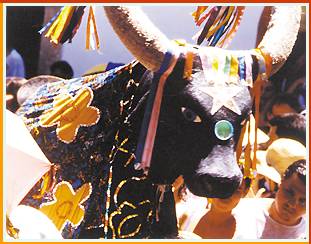 |
 |
Meu boi morreu
My bull has died
que será de
mim? what will become of me?
manda buscar outro,
I will send for another
ô maninha,
my dear brother,
lá no Piauí.
there, in the state of Piauí.
'Auto' or
pastoral drama? It does not really matter. 'Bumba-meu-boi', a form
of hieratic theatre during the Christmas and Twelfth Night
celebrations, is one of the purest popular presentations in
existence. Although it is possible to note certain European
influences, the structure of the contents, the subjects, the
characters and the music are essentially Northeastern. |
Pereira
da Costa imagined that the origin of this 'auto' could be located during
the colonization of the State of Piauí around the end of the 17th
century. This assumption was made from the verses - my bull has died and I
will send for another from the State of Piauí. However, Pereira da Costa
also believes that it is quite possible that the bull originates from the
State of Pernambuco, because of the following verses :
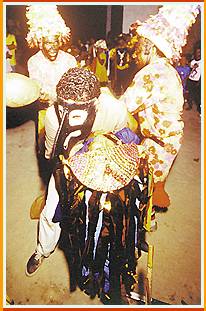 |
 |
Cavalo-marinho
The Sea Horse
dança bem baiano
dances the Baiano* well.
bem
parece ser
So well - he could be
um pernambucano.
From Pernambuco.
*
a kind of dance explained in Caboclinhos.
However, since there is no documented
proof, how can we justify the thesis that the
bull from Pernambuco is the oldest? The Bumbá
Bull from the Amazon, The Kings' Bull from the state of Maranhão,
The Surubi Bull from Ceará, The Calemba Bull from Rio Grande do
Norte, The Sea Horse from Paraíba, The Papaya Bull from Santa
Catarina and The Little Bull from Rio Grande do Sul, could all also
claim to be the oldest. The bull from Pernambuco, for certain,
possesses its own peculiar characteristics of the region, in the
same way that all the others also present regional characteristics.
|
Traditionally
presented during the Christmas Cycle, and nowadays also during carnival, 'Bumba-meu-boi' has been associated with
church festivities ever since the Medieval period. Festivities linked to
the bull have also been registered in many other countries and cultures - the Apis
Bull, the Isis Bull, The Mneris Bull, The Geroa Bull, The Bull of St. Mark etc.
The influences and links seem to go on forever.
| A
presentation of Bumba-meu-boi normally has a duration of up to eight
hours. The presentations takes place in an arena where the public
stand in a circle. As the presentation gets under way so the
circle opens wider to allow for freer movement. The characters of the
Mule, Mateus or Bastião, as we have seen previously in other
manifestations, are once more responsible, for opening the
proceedings with games and 'attacks', always at the cost of the
audience.
In the style of the Greek theatre, the actors either use masks, or
cover their faces with charcoal or a coloured mixture of flour and
water to
imitate a mask. There are no women in a Bumba-meu-boi presentation.
The female roles are usually played by men dressed as women, with
the exception of the Little Shepherdess, who is normally played by a
young girl, never a mature women.
|
 |
 |
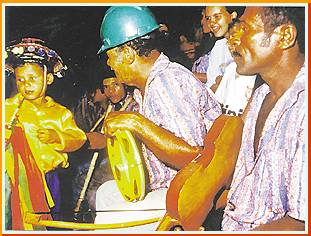
COMPONENTS OF
THE ORCHESTRA. |
 |
The
other female element to be found is the Cantadeira - the
Songstress, who sits beside the orchestra. The orchestra is
generally composed of a deep drum, maracas and tambourine, which are
played by the songstress during the songs. Unless the actors have
been especially contracted for some particular occasion, then the
actors receive payment by passing round the hat during the show. The
hat is taken round by either Bastião or Mateus. Of course, should
the spectator contribute what these two characters consider to be a
pittance, or indeed contribute nothing at all, then the spectators are open to
all kinds of abuse and jokes. |
The
characters are classified into three categories : human, animal and the
fantastic. The storyline for all the presentations are practically the
same.
The young shepherdess loses the bull, which was
in her protection,
and goes off in search of the animal.
During her
search, she comes across numerous characters
who make up the
show.
In the end, she manages to find the bull, which is
dead
but is finally resurrected.
THE
HUMAN CHARACTERS
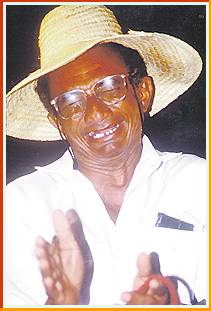
THE MASTER -
SALUSTIANO. |
 |
The
Captain is the big boss of the show. He commands the show through
his speeches, his songs and dances. He arrives on foot, but as the
show progresses he mounts the 'sea horse'.
His main assistants are Mateus and Bastião who carry bull bladders
-balloons - full of air, in their
hands.
Beside the Captain's horse is Harlequin, who also at times acts as
the
attendant.
Catirina is a freed black woman
and singer, who in some presentations ends up as Mateus' wife. The
Young Shepherdess looks after the bull that is lost. Turtuqué is
the great daredevil, who boasts too much and ends up demoralized.
Other characters are - the Engineer, the Priest, the Doctor, Mané -
the good-looking one, Zabelinha, the Sexton, the Inspector, Master Domingos,
the Master of the Loom, Romeiro,
the Smoking Country Bumpkin, the Complainer, Mde. Joana, the Archer
Native, the Field Captain, The Barber, the Apothecary, John Sheep
etc.
|
THE
ANIMALS
The
Emu, the Mule, the Snake, the Woodpecker and of course the main character
- the Bull.
THE
FANTASTIC CHARACTERS
The
Goblin, the Devil, Babau - a character created for the show, the
Deadman carrying a living man on his back, and Jaraguá
- a character who is able to take on various forms.
There are many who lament
that Bumba-meu-boi has undergone certain adulterations with the
passing of time. However, as Hermilo Borba Filho states in his
publication PRESENTATIONS OF BUMBA-MEU-BOI....this is
simply
nonsense. Every popular show is subject to momentary influences, day
after day, and it is performed by popular performers not
erudite.....
This is why Bumba-meu-boi
lives on. It is a popular show, created by what is popular - the
pure, innocent artist that continues to sing : |
 |
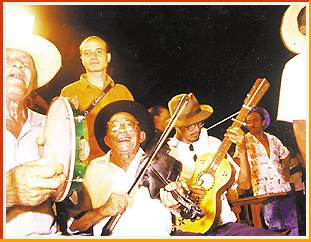
THE INSTRUMENTS USED
DURING THE SHOW. |
Meu boi morreu
My bull has died
que será de
mim? what will become of me?
manda buscar outro,
I will send for another one
ô maninha,
my dear brother,
lá no Piauí.
there, in the state of Piauí.
.
1The
word 'bumba' is a kind of interjection meaning - flop!, bang, wallop!. 'Meu
boi' means - my bull.

|